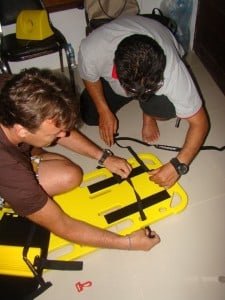So you’re embarking on your dream holiday in Asia. Your bags are packed, your guide book is in hand and you’ve made the customary pre-holiday dash to your local pharmacy to stock up on supplies for that all important 1st aid kit that will inevitably spend the entirety of your trip lurking somewhere in the depths of your backpack. But do you actually have all the important kit and knowledge you’d need to help yourself or others if you ever actually needed to use it?

When you (or more likely your friends or parents!) get to thinking about the risks of traveling in Asia, and all of those pesky ‘what if?’ scenarios, most people imagine rare tropical diseases, snake bites, malaria and so on. But the truth is that the real risks are much more mundane, and mainly avoidable by savvy travellers. Handy hint for Koh Tao visitors – if you can’t drive a motorbike, don’t rent one. This alone will probably slash your chances of a late night visit to a local clinic! If something does go wrong though, don’t panic – you are in safe hands on Koh Tao.

The clinics here are well equipped and professional, and can deal with the vast majority if incidents in-house. Also, you have the benefit of being on a dive orientated island. All dive instructors are also CPR and 1st aid instructors, so are great people to have around in an emergency. As an instructor myself, I’m used to looking after students in the water and on the boat, and I’d be lying if I said I haven’t been through many of those ‘what if’ scenarios in my head. However outside the diving bubble and back on dry land, my knowledge and expertise is nowhere near as extensive.

So let’s say you do run into problems during your stay – you witness a motorcycle accident for example, or your friend collapses on the beach. Would you know what to do? And feel comfortable doing it? I certainly wouldn’t, and it is with this in mind that I enrolled on the Challenging Environment Emergency Response (CEER) course run here on the island by Koh Tao Emergency Medical services in partnership with Exmed UK. The CEER course is a comprehensive 5 day programme covering all aspects of first response theory, scenarios and treatment. The primary focus is on what to do if you are the first person on the scene at the site of an accident or injury. This includes conducting a primary injury and illness survey and dealing with a wide range of situations including catastrophic, life threatening bleeding, cardiac arrest, breaks and fractures, severe traumas, chest and lung injuries, spinal injuries, heat related illnesses and many many more. Our skills of rescue breaths and chest compressions were retested, and we were also trained in the use of defibrillators, evacuation techniques, and triage. The teaching team were knowledgeable, experienced and professional, and I cannot really put into words how utterly worthwhile it was.

It scares me to think how totally unprepared I was for any of life’s surprises before, and I can’t recommend it enough to my friends and co-workers. It is literally the stuff of life, and something that everyone should have at least basic training in, especially if like me you are an avid traveller, often tucked away in remote areas which may be a considerable distance from emergency medical services and hospitals. Plus it was great fun. I’m already planning on taking the advanced course when it starts running on Koh Tao next year. But for now back to work….. So here I am, back in the dive shop classroom with my new group of students watching their open water videos. Maybe one of them is you. I hope you have a great time on Koh Tao and have a safe and happy stay. But if not, and you suddenly find yourself in need of some emergency assistance…I’m your girl!
This post was written by Linzi who attended Koh Tao Emergency Services Challenging Environments Emergency Response Course. This course runs regularly on Koh Tao, so if you are interested, get intouch with us for more details.
